-
Thursday 2 March, 7 p.m.
Session 1
Abbas Fahdel. Homeland (Iraq Year Zero). Before the fall
Iraq, 2015, original version Spanish subtiles, colour, 160’
With a presentation by the series’ curators, David Varela and Chema González, and the film-maker Abbas FahdelThere will be a second screening of this movie on Saturday, March 11 at 11 a.m.
A monumental diptych dealing with the before and after of the Iraq War in 2003, an invasion which heralded the start of a long cycle of exile in the Middle East. Homeland depicts the reality facing a country in armed conflict through the day-to-day lives of the director’s relatives, friends and compatriots confronting the injustices and consequences of a world policy of looting without a black-and-white and stereotypical discourse. The film, an indisputable counter-image of the media construction of contemporary war, restores the voice and face of the leading figures in the tragedy, making apparent the importance of the “face-to-face ethnic relation” put forward by Emmanuel Lévinas.
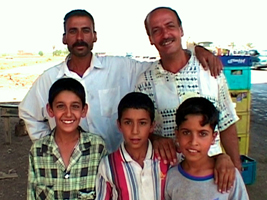
-
Friday 3 March, 7 p.m.
Session 2
Abbas Fahdel. Homeland (Iraq Year Zero). After the Battle
Iraq, 2015, original version Spanish subtiles, colour, 174'
The screening will be followed by a discussion with Abbas FahdelThere will be a second screening of this movie on Saturday, March 11 at 4 p.m.
Three hundred miles is the distance separating Daraa from Aleppo, making up, from south to north, the full expanse of Syria. It is also the distance the film-maker travels across to understand the progressive standardisation of destruction and death in the country in recent years. The film, viewed as one of the most lucid and panoramic illustrations of recent Syrian history, charts a disjointed map, in which internal exile and disillusionment live together behind a revolution gnawed down to civil war.
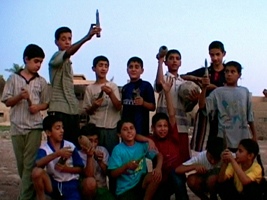
-
Thursday 9 March, 7 p.m.
Session 3
Orwa Al Mokdad. 300 Miles
Syria, Lebanon, 2016, original version Spanish subtiles, colour, 95'
With a presentation by Eyas Al Mokdad, film producer.There will be a second screening of this movie on Saturday, March 18 at 7 p.m.
Three hundred miles is the distance separating Daraa from Aleppo, making up, from south to north, the full expanse of Syria. It is also the distance the film-maker travels across to understand the progressive standardisation of destruction and death in the country in recent years. The film, viewed as one of the most lucid and panoramic illustrations of recent Syrian history, charts a disjointed map, in which internal exile and disillusionment live together behind a revolution gnawed down to civil war.
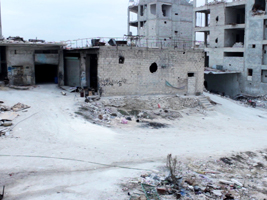
-
Friday 10 March, 7 p.m.
Session 4
Liwaa Yasji. Haunted
Germany, Syria, 2014, original version Spanish subtiles, colour, 113'There will be a second screening of this movie on Sunday, March 19 at 5 p.m.
Judith Butler has written about the world divided into grievable lives and ungrievable lives. The sentimental role of the image is only granted to lives worthy of being mourned, while the Other would be that which lacks a public image with which to be remembered by. This film dismantles such a division to reconstruct the domestic and intimate life of the exile when he or she is deciding whether to stay and wait for death among the ruins of home or to roam like a spectre in search of salvation. Haunted approaches the war in Syria through this traumatic decision in different episodes: 'Will this be our last image?' some of the protagonists wonder as they stand before a derelict house.
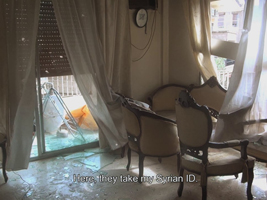
-
Thursday 16 March, 7 p.m.
Session 5
Mahdi Fleifel. A World Not Ours
Lebanon, United Kingdom, Denmark, 2012, original version Spanish subtiles, colour, 93'There will be a second screening of this movie on Saturday, March 25 at 7 p.m.
Mahdi Fleifel melds fiction and autobiography in a film which turns to the anomaly of humour to put across collective drama: the refugee camp as a permanent home; sixty years of exile in a place of repeated stories and inherited frustration. This is the microcosm which embodies the idea of Palestine, a State-less nation, subjugated inside and outside its borders. The director’s movement –the freedom to come and go from the camp at all times – is at odds with the frozen life of relatives and friends, seized in time and space, where the security of enclosure makes them see life outside as an unnecessary risk. They are used to being part of a political limbo which ensures their survival and the continuation of a national history lived through memories and landscapes that many never knew.
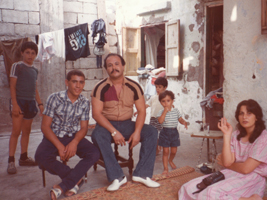
-
Friday 17 March, 7 p.m.
Session 6
Youssef Chebbi, Ismaël and Eddine Ala Slim. Babylon
Tunisia, 2012, original version Spanish subtiles, colour, 119'There will be a second screening of this movie on Sunday, March 26 at 5 p.m.
Babylon is a political non-place where the forcibly displaced and a large number of refugees who escaped the violence triggered by the Arab Spring in 2011 come together. With a direct and rough-edged narration seen through the eyes of three young film-makers, the film shows the process of the gestation, development and dismantling of a huge Babel on the border between Libya and Tunisia, territory without its own tongue and time, where survival is unearthed as the main nexus of communication between its inhabitants. Babylon’s non-use of subtitles to show the confusion in the camp is also intensely communicative, demonstrating the architecture of shelter as a laboratory of human survival.
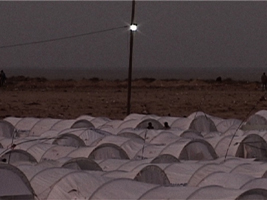
-
Wednesday 22 March, 7 p.m.
Session 7
Charles Heller and Lorenzo Pezzani. Liquid Traces – The Left-to-Die Boat Case
2014, original version Spanish subtiles, colour, 17'
Philip Scheffner. Havarie
Germany, 2016, original version Spanish subtiles, colour, 93'There will be a second screening of these movies on Saturday, April 1 at 12 p.m.
Liquid Traces – The Left-to-Die Boat Case is a work by the multidisciplinary collective Forensic Architecture. With involvement in the search for public evidence from the unquestionable testimony of the artistic image, the piece recounts the case of a ship left abandoned over two weeks in 2011 between Tripoli and Lampedusa, resulting in sixty-three deaths out of a crew of seventy-two African migrants. The film presents the Mediterranean as one of the most sophisticated and heavily monitored surveillance networks through viewing the data generated during the event. This evidence is made clear by the degree of knowledge and responsibility of European states and supranational organisations regarding the events that unfolded in these waters.
Philip Scheffner, meanwhile, disrupts transience in Havarie, converting a three-minute-long amateur video into a total of ninety-three minutes, comprising the film’s only shot: a boat with stranded migrants recorded on a mobile phone from the deck of a transatlantic cruise liner. The accounts compiled and presented in a voiceover generate new layers of reflection for facing up to the collective responsibility of this shipwreck.
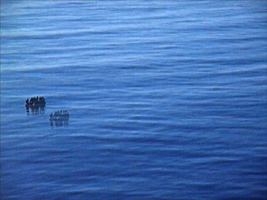
-
Thursday 23 March, 7 p.m.
Session 8
Akram Zaatari. Beirut Exploded Views
Lebanon, 2014, original version Spanish subtiles, colour, 28'
Avi Mograbi. Between Fences
France, Israel, 2016, original version Spanish subtiles, colour, 84'
With a presentation by Avi Mograbi. The screening will be followed by a discussion with the film directorThere will be a second screening of these movies on Sunday, April 2 at 5 p.m.
Avi Mograbi and Akram Zaatari, Israeli film-maker and Lebanese artist, respectively, play out a theatrical strategy and employ different performance tools to begin a process of healing or, at the very least, an expression of the traumatic experiences suffered by displaced people during their transit towards a place of confinement. Akram Zaatari presents a future of technological reclusion and dreamed-about hope through a situation frozen into longed-for gestures and bodies, which recreate the refugee’s wait in Beirut. In Mograbi’s film, on the other hand, refugees withstand the tough prison conditions imposed upon them in the Israeli detention centre of Holot, whilst also remaking their subjectivity and explaining their living conditions by designing a stage piece inspired by the thesis of Augusto Boal’s Theatre of the Oppressed. The film looks at two seemingly opposite registers which manage to unite in the same search: individual resistance from collective theatre.
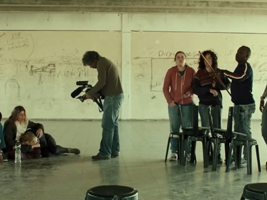
-
Thursday 30 March, 7 p.m.
Session 9
Maria Kourkouta and Niki Giannari. Spectres are Haunting Europe
Greece, 2016, original version Spanish subtiles, colour, 99'There will be a second screening of this movie on Monday, April 3 at 7 p.m.
Idomeni is a refugee camp on the border between Greece and Macedonia. Thousands of people are stranded under the rain following the closure of the “Balkan Route” decreed by Europe, whilst the train that crosses the zone moves by without stopping with its flow of goods and capital. Feet submerged in mud, broken and makeshift shoes, never-ending queues. There is no metaphor, just the cold. A group decide to occupy the train tracks. The film is presented as a triptych: the first part addresses daily life in the camp through static shots and constant waiting; the second is where the refugees, in an act of awareness-raising, block the train, confronting the symbolic dimension of the border; and the third, shot in 16 mm film as opposed to digitally, as in the previous two, with its bleak poetry, collecting the experiences of Greek refugees in Syria in 1922 and fragments from Walter Benjamin’s diary on the closure of another border in 1940: the border of Europe against fascism.
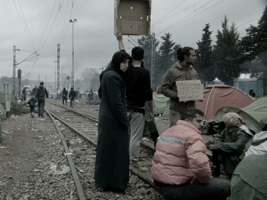
-
Friday 31 March, 7 p.m.
Session 10
Sylvain George. May They Rest in Revolt (Figures of war)
France, 2010, original version Spanish subtiles, colour, 150'There will be a second screening of this movie on Saturday, April 8 at 6 p.m.
Incarnate spectres living in a permanent state of exception. Calais as the direct representation of the collective dispossession of the individual’s fundamental rights and their resulting criminalisation. Sylvain George is one of the most resolute contemporary film-makers to redefine militant cinema through the balance between its political and experimental capacity. Shot over three years, the film shows the life of migrants in the French town of Calais - nature framing a place of harassment. The black and white, contrasts, and intensity equals everything in the same context of persecution and escape. Details define history. Birds, branches, fences, clouds, the digital fingerprints that refugees divide up and burn so as not to not be recognised, to definitively cancel out an identity which is just a body, a bare life; bodies of the living dead.

-
Saturday 1 April, 7 p.m.
Session 11
Maki Berchache and Nathalie Nambot. Brûle la mer
France, 2014, original version Spanish subtiles, colour, 75'There will be a second screening of this movie on Sunday, April 9 at 5 p.m.
Revolution as a rough sea that could leave us naked and defenceless on a deserted European shore. This is the place Maki Berchache, the film’s co-director, reached as he fled Tunisia after the fall of Ben Ali. His story is told by all Tunisians; colonised lives – here, there – the struggle for freedom – here, there – eternal borders, “even sometimes on faces”, in the director’s own words. Devised as a dialogue of shared authorship, Brûle la mer is not merely militant cinema but rather militancy building cinema, community. The poetics of political cinema.
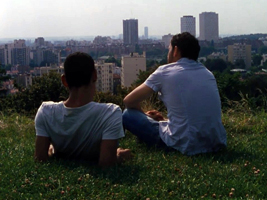
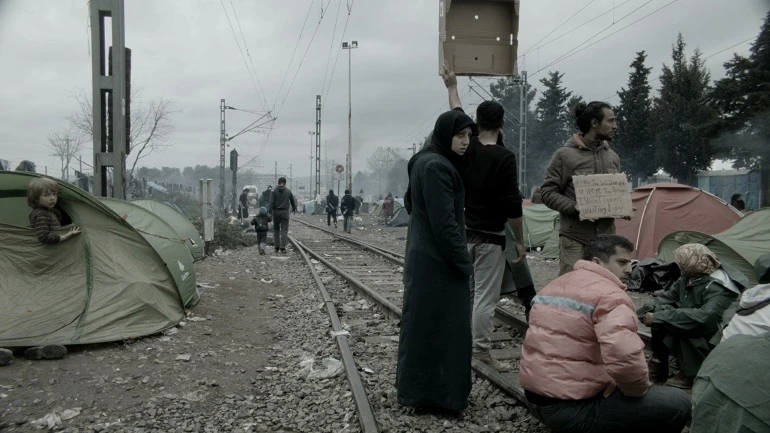
Maria Kourkouta and Niki Giannari. Spectres are Haunting Europe, 2016
Held on 02, 03, 09, 10, 11, 16, 17, 18, 19, 22, 23, 26, 30, 31 Mar, 01, 02, 03, 08, 09 Apr 2017
All sessions will be screened in digital format.
* Please, check the scheduled hours for second screenings.
This series looks at how recent documentary film has confronted and responded to the refugee crisis, considering in which form this humanitarian catastrophe has paradigmatically defined the conditions of existence in a new world under a geopolitical and subjective level. A system of relations governed by the necropolitical divide, a term coined by political theorist Achile Mbembe and used to define a new and perverse global power which polarises countries and territories between spaces of life and spaces of death in life, in which the ever-present refugee camps within European limits are no longer an exception but rather an acknowledgement of a de-territorialised and spectral citizens devoid of rights. What is the ethical and political position of images in the face of this state of exception as the norm?
No shelter. Images of Contemporary Exile presents recent films from Iraq, Syria, Palestine and Tunisia, works which seek to define a cinema of history through testimony, documents and personal experience regarding the consequences of successive wars. Some other films employ theatricality and performativity to rehearse the different tactics of representation in a precarious and resistant subjectivity, while others address the idea of Europe as a fortress, the border as a space of global surveillance, or the troubling and sinister contemporary shadow cast over the exclusionary policies which pervaded the continent in the 1930s. In sum, this film series is an attempt to research and debate the lingering presence and imaginaries of the diverse forms of current exiles and diasporas, the physical and personal experiences of war and the construction of a reclusive identity across the Western borders.
Curatorship
David Varela and Chema González
Itinerary
Festival Alcances, Cádiz (16 - 21 september, 2017)
Itinerancies
Festival Alcances, Cádiz
16 September, 2017 - 21 September, 2017
Más actividades

Aesthetics of Peace and Desertion Tactics
8 October 2025 – 24 June 2026
The study group Aesthetics of Peace and Tactics of Desertion: Prefiguring New Pacifisms and Forms of Transitional Justice proposes a rethinking—through both a theoretical-critical and historical-artistic lens—of the intricate network of concepts and practices operating under the notion of pacifism. A term not without contestation and critical tension, pacifism gathers under its name a multiplicity of practices—from anti-militarism and anti-war movements to non-violence activism—while simultaneously opening urgent debates around violence, justice, reparation, and desertion. Here, pacifism is not conceived as a moral doctrine, but as an active form of ethical and political resistance capable of generating aesthetic languages and new positions of social imagination.
Through collective study, the group seeks to update critical debates surrounding the use of violence and non-violence, as well as to explore the conflict of their representation at the core of visual cultures. In a present marked by rearmament, war, genocide, and the collapse of the social contract, this group aims to equip itself with tools to, on one hand, map genealogies and aesthetics of peace—within and beyond the Spanish context—and, on the other, analyze strategies of pacification that have served to neutralize the critical power of peace struggles. Transitional and anti-punitive justice proposals will also be addressed, alongside their intersections with artistic, visual, and cinematic practices. This includes examining historical examples of tribunals and paralegal activisms initiated by artists, and projects where gestures, imaginaries, and vocabularies tied to justice, reparation, memory, and mourning are developed.
It is also crucial to note that the study programme is grounded in ongoing reflection around tactics and concepts drawn, among others, from contemporary and radical Black thought—such as flight, exodus, abolitionism, desertion, and refusal. In other words, strategies and ideas that articulate ways of withdrawing from the mandates of institutions or violent paradigms that must be abandoned or dismantled. From feminist, internationalist, and decolonial perspectives, these concepts have nourished cultural coalitions and positions whose recovery today is urgent in order to prefigure a new pacifism: generative, transformative, and radical.
Aesthetics of Peace and Tactics of Desertion, developed and led by the Museo Reina Sofía’s Studies Management, unfolds through biweekly sessions from October to June. These sessions alternate between theoretical discussions, screenings, work with artworks and archival materials from the Museo’s Collection, reading workshops, and public sessions. The group is structured around sustained methodologies of study, close reading, and collective discussion of thinkers such as Judith Butler, Elsa Dorlin, Juan Albarrán, Rita Segato, Sven Lütticken, Ruth Wilson Gilmore, and Franco “Bifo” Berardi; historical episodes such as the anti-nuclear and anti-arms race movement in Spain; and the work of artists and activists including Rojava Film Commune, Manuel Correa and the Oficina de Investigación Documental (Office for Documentary Investigation), and Jonas Staal, among other initial cases that will expand as the group progresses.

Institutional Decentralisation
Thursday, 21 May 2026 – 5:30pm
This series is organised by equipoMotor, a group of teenagers, young people and older people who have participated in the Museo Reina Sofía’s previous community education projects, and is structured around four themed blocks that pivot on the monstrous.
This fourth and final session centres on films that take the museum away from its axis and make it gaze from the edges. Pieces that work with that which is normally left out: peripheral territories, unpolished aesthetics, clumsy gestures full of intent. Instead of possessing an institutional lustre, here they are rough, precarious and strange in appearance, legitimate forms of making and showing culture. The idea is to think about what happens when central authority is displaced, when the ugly and the uncomfortable are not hidden, when they are recognised as part of the commons. Film that does not seek to be to one’s liking, but to open space and allow other ways of seeing and inhabiting the museum to enter stage.

Intergenerationality
Thursday, 9 April 2026 – 5:30pm
This series is organised by equipoMotor, a group of teenagers, young people and older people who have participated in the Museo Reina Sofía’s previous community education projects, and is structured around four themed blocks that pivot on the monstrous.
The third session gazes at film as a place from which to dismantle the idea of one sole history and one sole time. From a decolonial and queer perspective, it explores films which break the straight line of past-present-future, which mix memories, slow progress and leave space for rhythms which customarily make no room for official accounts. Here the images open cracks through which bodies, voices and affects appear, disrupting archive and questioning who narrates, and from where and for whom. The proposal is at once simple and ambitious: use film to imagine other modes of remembering, belonging and projecting futures we have not yet been able to live.

Remedios Zafra
Thursday March 19, 2026 - 19:00 h
The José Luis Brea Chair, dedicated to reflecting on the image and the epistemology of visuality in contemporary culture, opens its program with an inaugural lecture by essayist and thinker Remedios Zafra.
“That the contemporary antifeminist upsurge is constructed as an anti-intellectual drive is no coincidence; the two feed into one another. To advance a reactionary discourse that defends inequality, it is necessary to challenge gender studies and gender-equality policies, but also to devalue the very foundations of knowledge in which these have been most intensely developed over recent decades—while also undermining their institutional support: universities, art and research centers, and academic culture.
Feminism has been deeply linked to the affirmation of the most committed humanist thought. Periods of enlightenment and moments of transition toward more just social forms—sustained by education—have been when feminist demands have emerged most strongly. Awareness and achievements in equality increase when education plays a leading social role; thus, devaluing intellectual work also contributes to harming feminism, and vice versa, insofar as the bond between knowledge and feminism is not only conceptual and historical, but also intimate and political.
Today, antifeminism is used globally as the symbolic adhesive of far-right movements, in parallel with the devaluation of forms of knowledge emerging from the university and from science—mistreated by hoaxes and disinformation on social networks and through the spectacularization of life mediated by screens. These are consequences bound up with the primacy of a scopic value that for some time has been denigrating thought and positioning what is most seen as what is most valuable within the normalized mediation of technology. This inertia coexists with techno-libertarian proclamations that reactivate a patriarchy that uses the resentment of many men as a seductive and cohesive force to preserve and inflame privileges in the new world as techno-scenario.
This lecture will address this epochal context, delving into the synchronicity of these upsurges through an additional parallel between forms of patriarchal domination and techno-labor domination. A parallel in which feminism and intellectual work are both being harmed, while also sending signals that in both lie emancipatory responses to today’s reactionary turns and the neutralization of critique. This consonance would also speak to how the perverse patriarchal basis that turns women into sustainers of their own subordination finds its equivalent in the encouraged self-exploitation of cultural workers; in the legitimation of affective capital and symbolic capital as sufficient forms of payment; in the blurring of boundaries between life and work and in domestic isolation; or in the pressure to please and comply as an extended patriarchal form—today linked to the feigned enthusiasm of precarious workers, but also to technological adulation. In response to possible resistance and intellectual action, patriarchy has associated feminists with a future foretold as unhappy for them, equating “thought and consciousness” with unhappiness—where these have in fact been (and continue to be) levers of autonomy and emancipation.”
— Remedios Zafra

27th Contemporary Art Conservation Conference
Wednesday, 4, and Thursday, 5 March 2026
The 27th Contemporary Art Conservation Conference, organised by the Museo Reina Sofía’s Department of Conservation and Restoration, with the sponsorship of the Mapfre Foundation, is held on 4 and 5 March 2026. This international encounter sets out to share and debate experience and research, open new channels of study and reflect on conservation and the professional practice of restorers.
This edition will be held with in-person and online attendance formats, occurring simultaneously, via twenty-minute interventions followed by a five-minute Q&A.